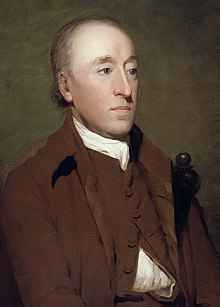
Back جيمس هوتون Arabic جيمس هوتون ARZ Ceyms Hetton Azerbaijani جیمز هاتن AZB Джеймс Хътън Bulgarian James Hutton Catalan James Hutton Czech James Hutton Danish James Hutton German Τζέιμς Χάτον Greek
James Hutton | |
|---|---|
 Hutton as painted by Sir Henry Raeburn | |
| Born | 14 June 1726 |
| Died | 26 March 1797 |
| Citizenship | British |
| Known for | Plutonism; Deep time |
| Scientific career | |
| Fields | Geology |

James Hutton MD (Edinburgh, (14 June 1726 – 26 March 1797) was a Scottish geologist, physician, naturalist, chemist and experimental farmer.
Hutton studied in medicine, but never practised it. Instead, he did scientific research, helped to start a chemical industry, and farmed his estate. He is one of the founders of modern geology.[1][2] He saw the Earth as the product of natural forces. What could be seen happening today, over long periods of time, could produce what we see in the rocks.
His book on the Theory of the Earth set out theories of geology and geologic time.[3] These ideas supported the theories of plutonism and uniformitarianism.
- ↑ "Millennial Plaques: James Hutton". University of Edinburgh. Archived from the original on 2007-11-01. Retrieved 2011-01-07.
- ↑ David Denby (11 October 2004). "Northern Lights: How modern life emerged from eighteenth-century Edinburgh". The New Yorker. Review of James Buchan's Crowded with genius (Capital of the Mind in the UK).
In 1770, James Hutton, an experimental farmer and the owner of a sal ammoniac works, began poking into the peculiar shapes and textures of the Salisbury Crags, the looming, irregular rock formations in Edinburgh. Hutton noticed something astonishing—fossilized fish remains embedded in the rock. The remains suggested that volcanic activity had raised the mass from some depth in the sea. In 1785, he delivered a lecture to the Royal Society of Edinburgh, which included the remarkable statement that "with respect to human observation, this world has neither a beginning nor an end." Coolly discarding Biblical accounts of creation, the book that he eventually published, The Theory of the Earth, helped establish the foundations of modern geology.
- ↑ American Museum of Natural History (2000). "James Hutton: the founder of modern geology". Earth: Inside and Out.
The result, therefore, of this physical enquiry," Hutton concluded, "is that we find no vestige of a beginning, no prospect of an end.
© MMXXIII Rich X Search. We shall prevail. All rights reserved. Rich X Search